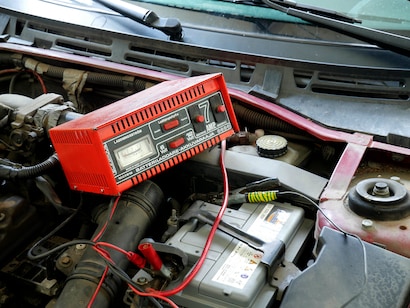Charging a car battery can vary in time. On average, it takes about 4 to 24 hours to fully charge.
Understanding the factors that affect charging time is important. Different car batteries have different capacities. The type of charger you use also plays a role. Slow chargers take longer but are gentler on the battery. Fast chargers can do the job quickly but may affect the battery’s life.
Ambient temperature and the battery’s condition are other factors. A well-maintained battery charges faster than an old one. In this blog post, we’ll explore these factors in detail. You’ll learn how to estimate the time needed for your specific battery. This knowledge helps you plan better and keep your car in good shape.

Credit: www.adrianflux.co.uk
Factors Influencing Charging Time
Understanding how long it takes to charge a car battery depends on several factors. These factors can significantly affect the charging time. Let’s explore these factors to get a clearer picture.
Battery Capacity
The capacity of a car battery is measured in ampere-hours (Ah). A battery with higher capacity will take longer to charge. For example, a 60Ah battery will charge slower than a 40Ah battery. Ensure you check your battery’s capacity to estimate the time needed.
Charger Type
The type of charger you use also impacts charging time. There are slow, fast, and rapid chargers. Slow chargers are the most common and take longer to charge. Fast chargers work quicker but may be more expensive. Rapid chargers provide the quickest charge but are often found at specific stations.
State Of Charge
The state of charge refers to how full or empty your battery is. If your battery is almost empty, it will take longer to charge. A battery that is half-full will need less time. Always consider the current charge level before estimating the time required.
Temperature
Temperature plays a crucial role in charging time. Cold temperatures can slow down the charging process. Extremely hot temperatures can also have a similar effect. Ideally, charge your battery in a moderate climate to achieve optimal results.
Types Of Car Batteries
Understanding how long it takes to charge a car battery depends on the type of battery. Different car batteries have different charging times. Let’s explore the common types of car batteries and their charging characteristics.
Lead-acid Batteries
Lead-acid batteries are the most common type found in vehicles. They are reliable and affordable. Charging a lead-acid battery typically takes 10 to 12 hours using a standard charger. Fast chargers can reduce this time to 2 to 4 hours. Ensure the battery is not overcharged to avoid damage.
Lithium-ion Batteries
Lithium-ion batteries are popular in modern electric and hybrid cars. They charge faster than lead-acid batteries. A full charge can be achieved in 1 to 3 hours with a fast charger. Standard chargers may take 4 to 6 hours. These batteries are lightweight and have a longer lifespan.
Nickel-metal Hydride Batteries
Nickel-metal hydride batteries are used in some hybrid vehicles. They offer a good balance between cost and performance. Charging times for these batteries range from 3 to 8 hours. Fast chargers can cut this time down. They are more environmentally friendly than lead-acid batteries.
Different Charging Methods
Charging a car battery can be done in several ways. Each method has its own advantages and time requirements. Understanding these methods can help you choose the best one for your needs.
Trickle Charging
Trickle charging is a slow process. It delivers a low amount of current over a long period. This method is gentle on the battery and prevents overcharging. It is ideal for maintaining batteries that are not used often.
- Delivers low current
- Prevents overcharging
- Good for maintaining infrequently used batteries
Trickle charging can take up to 24 hours to fully charge a battery. This makes it a good option for overnight charging.
Fast Charging
Fast charging provides a high amount of current in a short time. This method is useful when you need a quick charge. However, it can be harsh on the battery if used too often.
| Pros | Cons |
|---|---|
| Quick charging time | Can be harsh on the battery |
Fast charging typically takes around 1 to 3 hours. This makes it suitable for emergencies or quick top-ups.
Jump Starting
Jump starting is a method used when the battery is completely dead. It involves using another vehicle’s battery or a jump starter pack. This method provides an immediate boost to the battery.
- Connect the jumper cables correctly
- Start the donor vehicle
- Wait a few minutes and then start your car
Jump starting does not fully charge the battery. It only provides enough power to start the engine. You should drive the car for at least 30 minutes to help recharge the battery.
Using A Portable Charger
Charging a car battery with a portable charger is convenient and easy. Portable chargers are small, lightweight, and user-friendly. They offer a quick solution to dead batteries. Many drivers prefer them for their simplicity and effectiveness. Learn the key benefits and what to expect in terms of charging time.
Advantages
Portable chargers are easy to carry and store. They fit in your trunk or glove compartment. They are also simple to use. Just connect the clamps to the battery terminals and turn on the device. Most portable chargers have safety features. These include protection against overcharging and short circuits. This makes them safe for anyone to use.
Charging Time Expectations
Charging time varies based on the charger’s power and your battery’s condition. A typical portable charger might take 2 to 6 hours. This depends on the battery’s charge level and the charger’s output. Higher output chargers can charge faster. Always check the manufacturer’s guidelines for the best results. Regular maintenance can also help speed up the charging process.
Home Charging Options
Charging your electric car at home offers convenience and flexibility. It allows you to recharge while you sleep or go about your daily tasks. There are different home charging options, each with its own advantages. Let’s explore these options in detail.
Standard Outlet
A standard outlet, also known as a Level 1 charger, is the most basic option. It uses the same kind of outlet you use for household appliances. This method is easy and affordable. Simply plug the charger into your car and the outlet. However, it takes longer to charge your battery fully. You can expect to gain about 4-5 miles of range per hour. This option is good for overnight charging or if you don’t drive long distances daily.
Dedicated Charging Station
A dedicated charging station, or Level 2 charger, offers faster charging. It requires a special installation by a professional. This setup uses a 240-volt outlet, similar to what you use for a dryer or oven. It can charge your car much faster than a standard outlet. You can gain up to 25 miles of range per hour. This is great for those who drive more or need quicker charging. Although it costs more upfront, the convenience and speed make it worthwhile.

Credit: www.adrianflux.co.uk
Public Charging Stations
Public charging stations are essential for electric vehicle (EV) owners. They offer convenience and accessibility when charging your car battery. Understanding their availability and time requirements can help you plan your trips better.
Availability
Public charging stations are becoming more widespread. You can find them in:
- Shopping malls
- Parking lots
- Highway rest stops
- Office buildings
Some apps and websites provide real-time information on the nearest charging stations. This makes it easier to locate one when needed.
Time Requirements
The time required to charge your car battery at a public station varies. It depends on the type of charger:
| Charger Type | Charging Time |
|---|---|
| Level 1 (120V) | 8-12 hours |
| Level 2 (240V) | 4-6 hours |
| DC Fast Charger | 30 minutes to 1 hour |
Level 1 chargers are the slowest. They are usually found in residential areas. Level 2 chargers are faster and common in public spaces. DC Fast Chargers are the quickest, ideal for long trips.
Consider these factors when planning your charging stops. It ensures your journey is smooth and uninterrupted.
Tips To Reduce Charging Time
Charging a car battery can sometimes feel like a waiting game. Reducing charging time is a common goal for many car owners. These tips can help speed up the process and keep your battery in good shape.
Maintaining Battery Health
Keeping your battery healthy is key. Regularly check the battery for corrosion. Clean it if necessary. Ensure all connections are tight. A well-maintained battery charges faster. Also, avoid deep discharges. They can harm the battery. Aim to recharge before it drops below 20%.
Optimal Charging Practices
Use a quality charger. Cheap chargers can be slow. Follow the manufacturer’s instructions. Charging in cooler temperatures is better. Heat can slow down the charging process. Also, consider using a smart charger. It can adjust the charge rate. This helps in reducing the overall charging time.

Credit: www.carcitywholesale.com
Common Mistakes To Avoid
Charging a car battery might seem straightforward, but common mistakes can cause issues. Avoiding these errors ensures your battery charges efficiently and safely. Here are some pitfalls to watch out for.
Overcharging
Overcharging a battery can reduce its lifespan. It can also cause overheating. To prevent this, use a charger with an automatic shut-off feature. Always monitor the charging process. Avoid leaving the charger on for too long. Check the battery’s manual for recommended charging times.
Using Incompatible Chargers
Using the wrong charger can damage your battery. Ensure the charger matches your battery’s voltage and type. Always double-check the specifications. Using incompatible chargers can lead to poor performance. It can also cause safety hazards. Choose a charger recommended by your car’s manufacturer.
Frequently Asked Questions
How Long Does It Take To Charge A Car Battery?
Charging times vary. It depends on the battery type and charger. Generally, it takes 4-24 hours.
Can I Charge A Car Battery Overnight?
Yes, you can. Most chargers are designed to charge slowly, making overnight charging safe.
What Affects Car Battery Charging Time?
Several factors affect it. Battery size, charger type, and battery condition are key factors.
Is Fast Charging A Car Battery Safe?
Yes, if done correctly. Use a smart charger to prevent overcharging and ensure safety.
How Do I Know When My Car Battery Is Fully Charged?
Most chargers have indicators. A green light or full meter means the battery is fully charged.
Conclusion
Charging a car battery varies based on several factors. Battery size, charger type, and battery condition play crucial roles. Generally, it can take anywhere from 30 minutes to several hours. A quick charger speeds up the process significantly. Regular maintenance helps keep the battery in good shape.
Always refer to your car manual for specific instructions. Remember, a well-charged battery ensures your car runs smoothly. So, monitor your battery health regularly. This way, you avoid unexpected breakdowns. Happy driving!

















